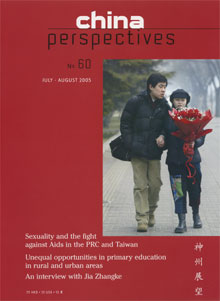
China Perspectives No. 60
- Special Feature
- Article
- Book Reviews
Aids in China: Discourses on Sexuality and Sexual Practices The state's management of the epidemic both reflects and illuminates social contradictions
The issues that have taken shape around the need to prevent the spread of HIV/Aids, and to manage the risks of an epidemic, throw light on the pressing contradictions within Chinese society. They offer a very pertinent approach for analysis of current changes in the field of sexuality and to understanding the variety of its discourses and practices. The theoretical perspective of this article will be informed by a constructivist approach, since such approaches have radically altered our understanding of sexuality by raising questions about the social and historical contexts that surround it. In China the history of sexually transmitted disease (STD) epidemics shows that the ways in which sexuality is managed have a greater impact than disease control measures or health education.
Nonetheless, despite the political efforts on the part of official agencies, combined with the dominant pressures of family values and of revitalised cultural traits inherited from the past, individuals are subjected to the multiple influences associated with globalisation and China's transformation into a consumer society. Recent studies have revealed marked shifts in the expression of sexuality.
This article has three sections. The first gives an analytical overview of current scientific literature, and of the available data concerning sexual behaviour and its representation. The second deals with governmental action and pronouncements in relation to the dynamics of the Aids epidemic and the risks of sexual transmission. And finally, the third section provides a diachronic analysis of the state's management of sexual issues.
Taiwanese NGOs and HIV/Aids: From the National to the Transnational
In Taiwan, as in the rest of the world, the health authorities have been confronted during the past decade by an inexorably growing number of cases of HIV/Aids. Local NGOs have committed themselves, in partnership with the authorities, to a national and regional response. This article will look at the methods used by these non-state actors, at the reasoning behind their actions and at the interactive and transnational character of their struggle.
Unequal Primary Education Opportunities in Rural and Urban China
This article examines the unequal provision of primary education in rural and urban China. It first looks at the development of the two-track system and shows how educational opportunities have always been unevenly distributed in contemporary China. It then focuses on the dominant task of primary educationthe universalisation of compulsory educationto underscore the profound difficulties that the Chinese government faces particularly in the provision of primary education in rural areas. The article concludes that the prospect of a successful delivery of primary education in the countryside lies in the further clarification of the financial relationship among different levels of the government, the diversification of sources of educational funding, and the integration of primary education with economic growth as the goal of sustainable development.
The World of Jia Zhangke
An interview with the director of Xiao Wu, Platform, Unknown Pleasures and The World
Michael Dillon, Xinjiang-China's Muslim Far North West
André Laliberté, The Politics of Buddhist Organizations in Taiwan 1989-2003. Safeguarding the faith, building a pure land, helping the poor
Marie Holzman, Chen Yan (eds.), Ecrits édifiants et curieux sur la Chine du XXIe siècle. Voyage à travers la pensée chinoise contemporaine
Richard C. Bush, At Cross Purposes. U.S.-Taiwan Relations Since 1942
Robert L. Suettinger, Beyond Tiananmen. The Politics of US-China Relations 1989-2000


